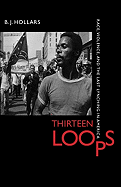
The 1981 murder of 19-year-old Michael Donald by two Ku Klux Klan members in Mobile, Ala., was not "the last lynching in America," which B.J. Hollars's Thirteen Loops: Race, Violence, and the Last Lynching in America readily admits, despite its title. Hollars (You Must Be This Tall to Ride) designates Donald's murder as the "last" lynching to point out the shift in American thinking from "lynching" to the broader term "hate crime," a label that encompasses the 1998 murder of Matthew Shepard and the 2008 killing of Angie Zapata as well as the grimly traditional image of black bodies dangling from trees.
Thirteen Loops weaves together three stories. The 1933 death of Vaudine Maddox in Tuscaloosa and the 1979 death of police Sgt. Gene Ballard in Birmingham lend context to the lynching of Michael Donald, which Hollars explores in detail. The result is a thorough, plainly told account of Donald's death and the trials that followed, making Thirteen Loops a solid and much-needed addition to the history of race violence in America. But Hollars goes further. In exploring the testimony and lives of Donald's murderers, Thirteen Loops also reveals that the impetus behind hate-crime lynchings--the desire further to oppress marginalized groups through fear--remains a conscious option in the collective consciousness, one that hate crime legislation acknowledges but cannot eliminate. --Dani Alexis Ryskamp, blogger at The Literary Cricket

